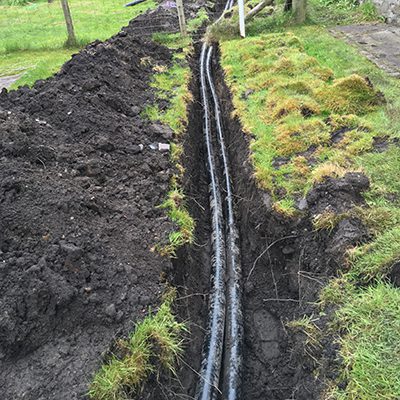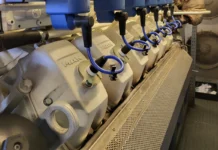
Shetland Heat Energy and Power (SHEAP) – the company responsible for the Lerwick district heating scheme – has for the first time in its 20-year history, installed an advanced flexible pre-insulated polymer pipe system to connect a new customer to its buried heat network.
Up until now, due to the heat network operating at a flow temperature of 95°C and 6 bar pressure, they had no alternative but to use traditional pre-insulated steel pipe as these parameters are beyond the safe limits for commonly-available polymer pipe systems such as PEX and polypropylene.
This all changed, says the company, when it was introduced to Hiline FibreFlex Pro, a new flexible pre-insulated composite polymer system that has a polymer service pipe reinforced with aramid fibres so it can safely operate at temperatures of up to 115°C and pressures of 16 bar.
SHEAP’s engineering manager, Roddy Christie-Henry was keen to evaluate its potential for the Lerwick system. He said: “We’re interested in systems that of course meet our strict quality and performance criteria, but as with every business, we do also need to find the most cost-effective means of making new connections – particularly as the town has a relatively-low heat density, meaning we have to travel a little further to reach each consumer.”
“With the FibreFlex Pro system being so flexible and delivered to site on a roll to minimise joints, our installer was able to excavate a trench along an easier route, which not only kept costs down, but also speeded the process up. Being so flexible, the 32mm diameter pipe could be bent sufficiently to make the house connection without the need for additional bends and fittings, which further lowered the cost.”
He continued: “We are very pleased with this initial experience and it has proven to be faster and more cost effective than the steel alternative, which is great news for our future plans to expand the network and literally ‘roll-out’ the benefits of district heating to new customers.”
Ben Sheppard, contracts manager at CPV Ltd, the supplier of the pipe system said: “Not only could Hiline FibreFlex Pro meet the client’s network operating parameters of 95°C at 6 bar and speed-up installation, but it also provides improved thermal performance when compared to a traditional pre-insulated steel network.”
“Across the available range, heat loss levels are lower than alternative systems using Series 3 insulation thickness for sizes up to 80mm diameter and lower than Series 2 for larger sizes – which of course significantly reduces operating costs over the lifetime of the system.
“Now, system owners and developers from as far north as Shetland right down to the Channel Islands are now recognising the benefits of using FibreFlex Pro as it not only offers performance advantages and lower installation costs, but zero potential for corrosion – unlike traditional steel systems.”
Where required, service pipe joints up to 160mm diameter can be made using a unique hydraulic press fitting that negates the need to expand the service pipe end as normally found with press fittings for PEX systems.
This project, including the on-site training for local installers has been supported by CPV working in partnership with the specialist Austrian manufacturing company Radius Kelit Infrastructure.







